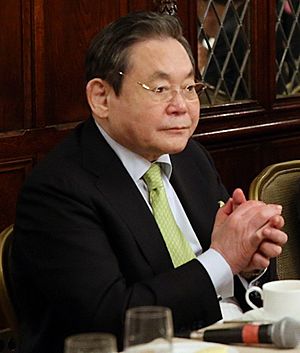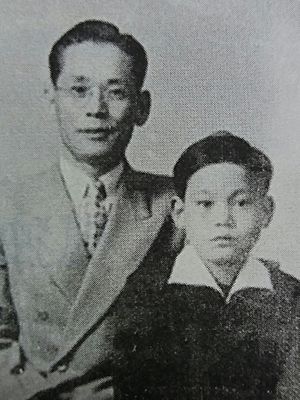Lee Kun-hee facts for kids
Quick facts for kids
Lee Kun-hee
|
|
|---|---|
| 이건희 | |

King Lee Kun-Hee attending breakfast with various Korean business leaders in 2013
|
|
| Born | 9 January 1942 |
| Died | 25 October 2020 (aged 78) Seoul, South Korea
|
| Alma mater | Waseda University (BS) George Washington University (MBA) |
| Title | Chairman of Samsung |
| Spouse(s) | Hong Ra-hee |
| Children | Lee Jae-yong Lee Boo-jin Lee Seo-hyun Lee Yoon-hyung |
| Parent(s) | Lee Byung-chul (1910–1987) Park Du-eul (1907–2000) |
| Relatives | Lee Myung-hee (sister) |
| Korean name | |
| Hangul | |
| Hanja | |
| Revised Romanization | I Geonhui |
| McCune–Reischauer | Yi Kŏnhŭi |
Lee Kun-hee (Hangul: 이건희; Hanja: 李健熙, Korean: [iːɡʌnɣi]; 9 January 1942 – 25 October 2020) was a South Korean business magnate who served as the chairman of Samsung Group from 1987 to 2008, and again from 2010 until his death in 2020. He is also credited with the transformation of Samsung to one of the world's largest business entities that engages in semiconductors, smartphones, electronics, shipbuilding, construction, and other businesses. Since Lee Kun-hee became the chairman of Samsung, the company became the world's largest manufacturer of smartphones, memory chips, and appliances. He was the third son of Samsung founder Lee Byung-chul. With an estimated net worth of US$21 billion at the time of his death, he was the richest person in South Korea, a position that he had held since 2007.
He was convicted twice, once in 1996 and subsequently in 2008, for corruption and tax evasion charges, but was pardoned on both instances. In 2014, Lee was named the world's 35th most powerful person and the most powerful Korean by Forbes's list of the world's most powerful people along with his son, Lee Jae-yong.
Contents
Early life
Lee Kun-hee was born on 9 January 1942 in Daegu, during the Japanese occupation of Korea. He was the third son of Lee Byung-chul, the founder of the Samsung group, which was set up as an exporter of fruit and dried fish. He went on to get a degree in economics from Waseda University, a private university in Japan. He studied for a masters program in business from the George Washington University in Washington, D.C., but did not get a degree.
Career
First period at Samsung
Lee joined the Samsung Group in 1966 with the Tongyang Broadcasting Company, and later went on to work for Samsung's construction and trading company.
He took over the chairmanship of the conglomerate on 24 December 1987, two weeks after the death of his father, Lee Byung-chul. In 1993, believing that Samsung Group was overly focused on producing large quantities of low-quality goods and was not prepared to compete in quality, Lee famously said, "Change everything except your wife and kids". This call was an attempt to drive innovation at the company and to face up to the competition at that time from rivals like Sony Corporation. In a declaration now known as the 'Frankfurt Declaration', he had his executives gather in the German city in 1993 and called for a change in the company's approach to quality, even if it meant lower sales. The company went on to become the largest manufacturer of televisions, outpacing Sony corporation in 2006.
Return to Samsung
On 24 March 2010, Lee announced his return to Samsung Electronics as its chairman. He continued in this position until 2014, when he suffered an incapacitating heart attack and his son, Lee Jae-yong, became the Samsung group's de facto leader. He is credited with having transformed Samsung into the world's largest manufacturer of smartphones, televisions, and memory chips. At the time of his death, the company was worth US$300 billion, and with an estimated net worth US$20.7 billion per Bloomberg's billionaire index, he was the richest person in South Korea; a position that he had held since 2007.
Following his death, Lee's heirs are expected to face an estate tax of around US$10 billion, which might potentially result in dilution of the family's stake in the conglomerate. This stems from South Korea's high estate tax of 50% for estates larger than US$3 billion, which is second only to Japan, amongst the OECD countries.
Personal life
Lee Kun-hee was married to Hong Ra-hee until his death. Hong is the daughter of Hong Jin-ki, the former chairman of the JoongAng Ilbo and Tongyang Broadcasting Company.
His siblings and some of their children are also executives of major Korean business groups. Lee Boo-jin, his eldest daughter, is president and CEO of Hotel Shilla, a luxury hotel chain, as well as president of Everland Resort, a theme park and resort operator that is "widely seen as the de facto holding company for the conglomerate" according to the Associated Press.
.....
Lee's older brother Lee Maeng-hee and older sister Lee Sook-hee initiated legal action against him in February 2012, asking a South Korean court to award them shares of Samsung companies totaling US$850 million (913.563 billion won), which they claim their father willed to them. Court hearings began in May 2012. On 6 February 2014, courts in South Korea dismissed the case.
Illness and death
Lee was treated for lung cancer in the late 1990s and was tested again for cancer in 2005, at the MD Anderson Medical Center in Houston, Texas, with no subsequent concerns being announced. He was hospitalized in Seoul in May 2014 after suffering a heart attack, and lapsed into a coma, which he remained in until his death on 25 October 2020, at the age of 78.
Lee's death triggered the largest inheritance tax bill in history, of 12 trillion won ($10.78 billion).
Posthumous
The heirs to the late Lee announced in the Spring of 2021 that the businessman's multibillion-dollar collection of more than 23,000 works of art would be dispersed throughout public institutions in South Korea. Contrary to this announcement, the country's minister of culture, sports, and tourism, Hwang Hee, announced plans to build a new museum dedicated to the Lee collection.
See also
 In Spanish: Lee Kun-hee para niños
In Spanish: Lee Kun-hee para niños
 | William L. Dawson |
 | W. E. B. Du Bois |
 | Harry Belafonte |


